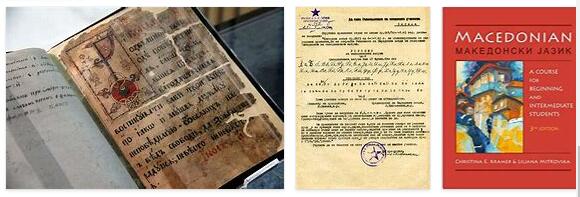Macedonian Language and Literature

Macedonian language
Macedonian language, the language belonging to the South Slavic group within the Slavic languages, which was declared the language of the Macedonians by resolution of the Macedonian People’s Liberation Council of 2.8.1944.
According to educationvv, the Macedonian language is spoken by around 1.4 million people in North Macedonia (official language since 1991) and, in the associated dialects, in parts of south-east Albania, north Greece and south-west Bulgaria.
The numerous dialects are divided into a western and an eastern group, with the central dialects of the western group forming the basis of the literary language. A Cyrillic alphabet is used in the largely phonetic spelling (exceptions: ŕ = palatal g, ḱ = palatal k, s = voiced affricates). The word accent is usually on the third from last syllable, in two-syllable words on the first; all vowels or syllables are short. Morphology and syntax of the Macedonian language have in the context of the Balkan languages Experience how they are shaped: An infinitive is missing (instead, subordinate clause constructions), but the verbal system is differentiated and rich in tenses and modes. It has, inter alia. special forms for statements based on hearsay, not personal participation or experience. Noun and adjective distinguish three genera (masculine, feminine, neuter) and two numbers (singular, plural; the masculine have their own counting form after numbers); the Slavic declension is largely lost; Case relations are usually expressed prepositionally; a vocative is in living use. Like the Bulgarian, Romanian and Albanian languages, Macedonian has a following article, which only appears here in three forms to express general or localized (near or far) determinacy, e.g. B. dete »(a) child«, deteto »the child«, detevo »the child (here)«, deteno »the child (there)«. Another special feature is the regular duplication of the object (»pronominalreprise«), whereby indirect and determined direct objects are announced by pronouns in the verb to clarify the syntactic references, e.g. B. Ivan i ja dava Ana knigata “Ivan (she) gives Ana the book”.
Macedonian literature
Macedonian literature, the literature of the Macedonians. It developed after the beginning in the 19th century (especially poetry strongly influenced by folk literature and romanticism: K. and D. Miladinov, R. Žinzifov, G. Prličev) and the program of a written language (1903) by Krste P. Misirkov (* 1874, † 1926) at the beginning of the 20th century in poems with national and social themes, v. a. K. Racin, Kole Nedelkovski (* 1912, † 1941) and Mite Bogoevski (* 1919, † 1942), especially after the codification (1944/45) of their own standard language.
After 1945 it was first of all poetry, which – based on the rich folk poetry – took up stylistic devices of European modernism (B. Koneski, A. Šopov, S. Janevski). The following years were dominated by intimate poetry (Gogo Ivanovski, * 1925; Srbo Ivanovski, * 1928) and a new sensitivity (Gane Todorovski, * 1929, † 2010; Mateja Matevski, * 1921; Ante Popovski, * 1931, † 2003) marked. In prose, following avant-garde approaches, representatives of the second post-war generation confronted realism and modernism (Branko Pendovski, * 1927, † 2011; Meto Jovanovski, * 1928; Dimitar Solev, * 1930, † 2003; Simon Drakul, * 1930, † 1999; Blagoja Ivanov, * 1931; Branko Varošija, * 1934), presented on topics and motifs about the turmoil and contradictions of humans. The Macedonian drama was also written in the 1950s (Kole Čašule, * 1921, † 2009; »Granica na vetru«, 1957). From the 1960s onwards, Macedonian poetry took on a variety of world literary impulses (A. Šopov; Radovan Pavlovski, * 1937; Bogomil Đuzel, * 1939; Petre Andreevski, * 1934, † 2006; Petre Boškovski, * 1936; Vlada Urošević, * 1934). An important characteristic was the symbolization of poetic language (Michail Rendžov, * 1936; Čedo Jakimovski, * 1940; Atanas Vangelov, * 1946). The prose shows a modernist orientation as well as a special interest in the historical development of the Macedonian people (Taško Georgievski, * 1935). Psychologically well-founded works were created about the war and the post-war period (Živko Čingo, * 1936, † 1978), village stories (Metodija Fotev, * 1932), imaginative and fantastic depictions of life in the city (V. Urošević). The drama also took up these themes (Tome Arsovski, * 1928, † 2007).
New tendencies developed in the 1970s. a. through language experiments (Eftim Kletnikov, * 1948; Risto Lazarov, * 1949; Katica Ćulakova, * 1951; Miloš Lindro, * 1952). The latest prose shows a renewed turn to the problems of rural life and historical topics (Andreevski), to a humorous-ironic as well as critical-moral view of society (Vladimir Kostov, * 1932; Božin Pavlovski, * 1942) and to national -patriotic themes (Časule; Jovan Strezovski, * 1931; Jovan Pavlovski, * 1937). Modern fictional prose is also characterized by the grotesque and black humor (Zoran Kovačevski, * 1943). The drama not only focuses on national-ideological and moral-psychological basic human situations, but also reacts in an artistically impressive manner to current conflict situations in the context of the breakup of Yugoslavia (Goran Stefanovski, * 1952).